Hyundai's Journey to Nepal: From Dealer to Industry

We use Google Cloud Translation Services. Google requires we provide the following disclaimer relating to use of this service:
This service may contain translations powered by Google. Google disclaims all warranties related to the translations, expressed or implied, including any warranties of accuracy, reliability, and any implied warranties of merchantability, fitness for a particular purpose, and noninfringement.

Highlights
- Lakshmi Group, which has started an assembled plant in Ramgram of Nawalparasi with an investment of two billion, uses 90 percent parts for vehicles from South Korea and India and the rest from Nepal.



Lakshmi Group has crossed five decades since its inception. During this period there are 20 companies under Lakshmi Group. One of those companies is Lakshmi Hyundai. Hyundai's journey, which started with a dealer, has reached the assembly industry today. The journey of Lakshmi Hyundai, which started with a dealer in Nayabaneshwar, Kathmandu, has reached from being an official dealer in Nepal to producing and selling.

Lakshmi Group was started by Buddhi Bahadur and Ganesh Bahadur Shrestha on 5th December 2030 as Lakshmi Mithai Bhandar in Pokhara. After that, it has gradually reached to vehicle production through plastic, dairy, steel business. Lakshmi Group was thinking of doing something in the automobile business. In 2002, Ganesh Bahadur's youngest son Nirakar Shrestha returned to Nepal after completing his Bachelor's in Hospitality Management in Switzerland. At that time, the Maoist conflict was at its peak.
It was only a year since the Darbar massacre. The tourism business was very relaxed. Amidst the challenges, the formless was preparing to enter the automobile sector. 'I thought of studying and researching which field I would embrace,' he says, 'I thought I should do something in the field of automobiles, and I got the opportunity to start automobile work for the first time in 2006.' -break At that time, who was the official distributor of Hyundai, he was looking for a dealer for Kathmandu. "After that, we started a dealer in Kathmandu," says Nirakar, "In 2008, we got an opportunity to import and distribute Hyundai vehicles ourselves." The dealer was started with an investment of 4.5 crores. "The market was small at that time, but we managed to sell 290 vehicles in the first year of starting the dealership," says Nirakar, Executive Director of Lakshmi Group. Anjan, Niranjan and Nirakar are three brothers. Sunil, who has a big father, is also in the business. "We are all part of the Sangol family, we are doing business separately in the group," he says, "I look at automobiles."
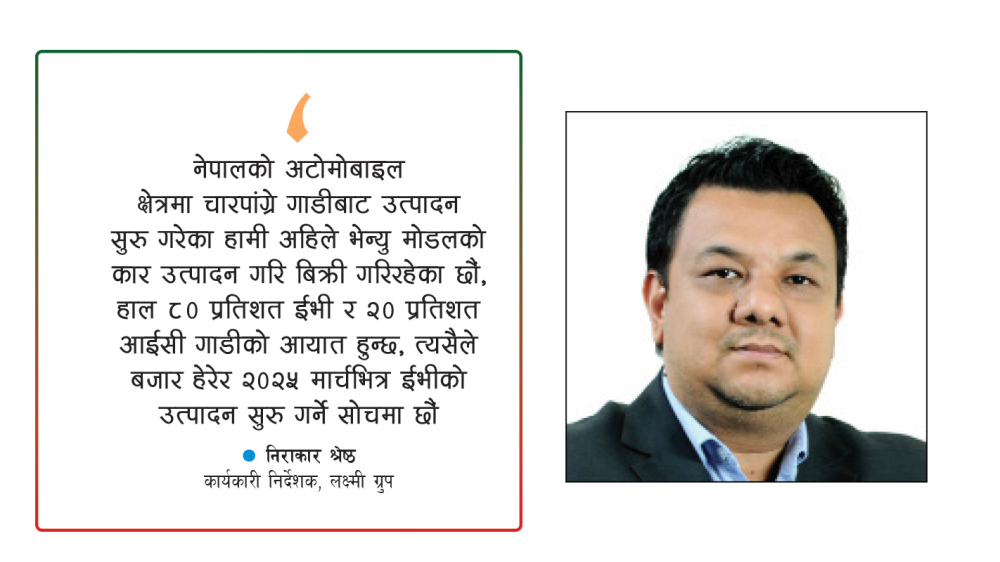
'Father's concept was that one should be an industrialist, this does not mean that business is bad, one day one should open an industry in one's own soil,' he says, 'At the same time, in 2011, to understand and study about the vehicle 'assembling' industry, Malaysia, Vietnam After reaching there and seeing the car being produced, it became clear that it can be produced in Nepal as well. Meanwhile, Hyundai's share in the market was increasing. "Looking back to 2017, we thought we had reached a level. After that level, we said that we should open the assembly industry, and we passed that level." ) done.
'The plan was to start production within 2021, in 2020 there was a lockdown/opening due to Covid-19,' he said, 'which affected the opening of the industry.' Meanwhile, the land for the industry had been acquired. The problem of covid came when the industry was being set up with enthusiasm. There was uncertainty as to how the market would move and what it would be like. According to him, the auto market rose sharply in 2021.
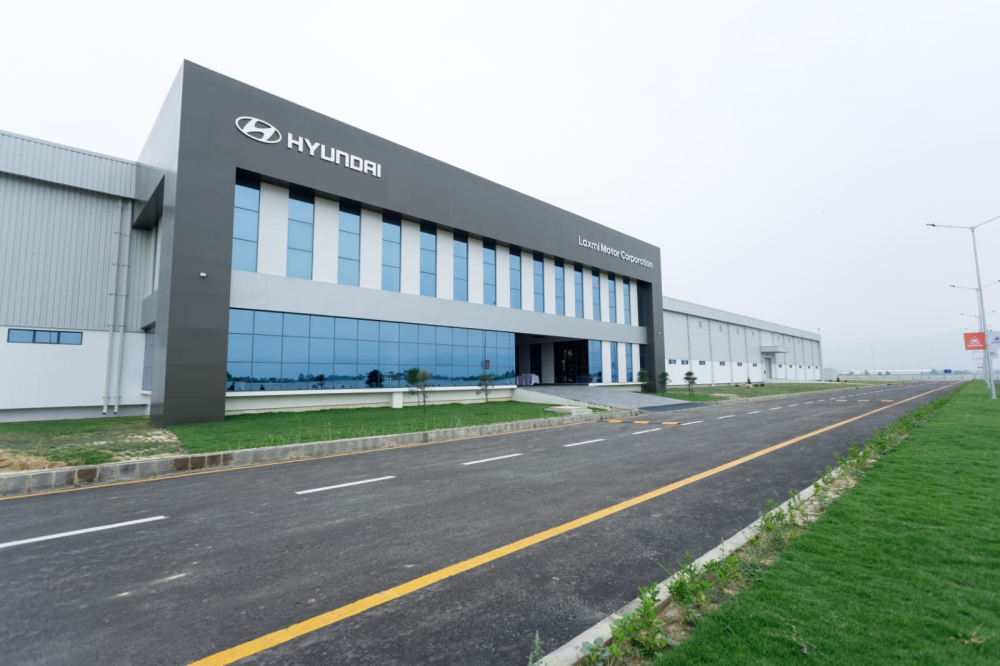
'Which was a good year for the automobile businessmen,' he said, 'Then we started making machines for the industry.' To produce vehicles in Nepal under Hyundai's brand, we need to get a license for its brand. He said that the process has been completed by the industry department and other agencies to get it. "Thus, the royalties of vehicles manufactured in Nepal under the brand name should be paid there," he said, "for that we completed all these works in the initial phase of 2022." At this time, the economic crisis occurred in Sri Lanka after the foreign currency (exchange) reserves decreased. It was rumored that Nepal is also at such a risk. Remittances were reduced due to covid. Tourist traffic became zero. Foreign exchange reserves were feared. "In order to reduce the risk of foreign exchange reserves, the government stopped the import of 10 types of goods including vehicles and motorcycles from April 2022," he said, "but we continued the work of the industry." From March 2023, its construction work started. 2024 March i.e. the work was completed within a year of the start of construction.
2081 On 28 Baisakh, the then Prime Minister Pushpa Kamal Dahal formally inaugurated the 'Assembly Plant' and the production of vehicles started. The industry is located in an area of 10 bighas within the Ramgram Municipality of Nawalparasi. In the industry, IC-engined fuel vehicles and electric (EV) vehicles will be built from the same 'assembling' line. Shrestha said that some equipment for EV vehicles should be added to the industry. Currently, only the Hyundai Venue car is being produced. The industry has been started with an investment of two billion including land. "We sell 12 models of Hyundai vehicles in Nepal," he said, "among them, we are currently producing only the Venue model." Among the 12 models, the contribution of the Venue model to the total sales is around 18 percent.
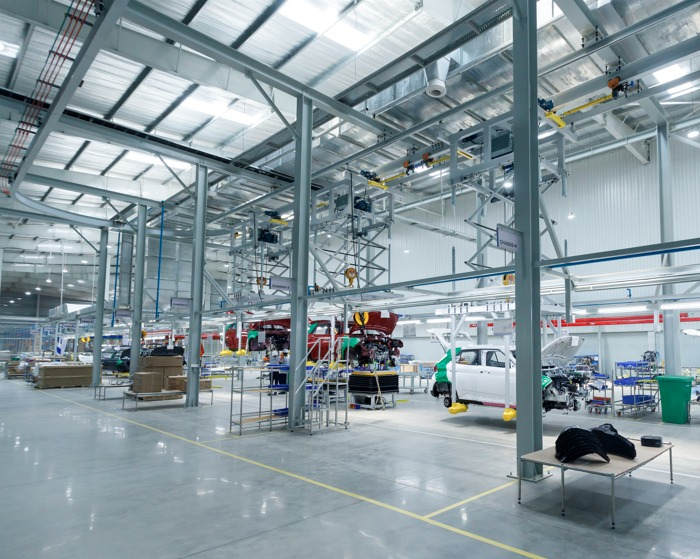
'After a year and a half of starting the production of IC vehicles, we were thinking of producing EV vehicles,' he said, 'We are preparing to speed up the production of EV vehicles by adding equipment without delay.' yes "Now we are making only one model," he said, "so only 10 to 12 percent of the total capacity is being produced." Since the industry started operation, 200 venue vehicles have been ready.
'In the beginning, no industry runs at full capacity,' he said, 'after the production of three models, the industry will run at 60 percent of the total capacity.' is kept "The purpose of this vehicle is to send a message about what can be done in Nepal by sending this car to Nepal," he said. "It is a matter of pride for us." One hundred people have been employed in the industry. More than 500 people will get employment when the industry runs at full capacity in the coming days. All those working in the industry are Nepalis.
"The production of four-wheeled vehicles has started in Nepal," he said. Electric vehicles were not. Since then, the dominance of electric vehicles has gradually increased. Therefore, IC vehicles are not the only vehicles in this industry. EV vehicles will also be produced. By 2021, 15/16 percent EVs and the rest IC vehicles would be imported. In 2023-24, 60 percent of EVs and 40 percent of IC vehicles began to be imported.
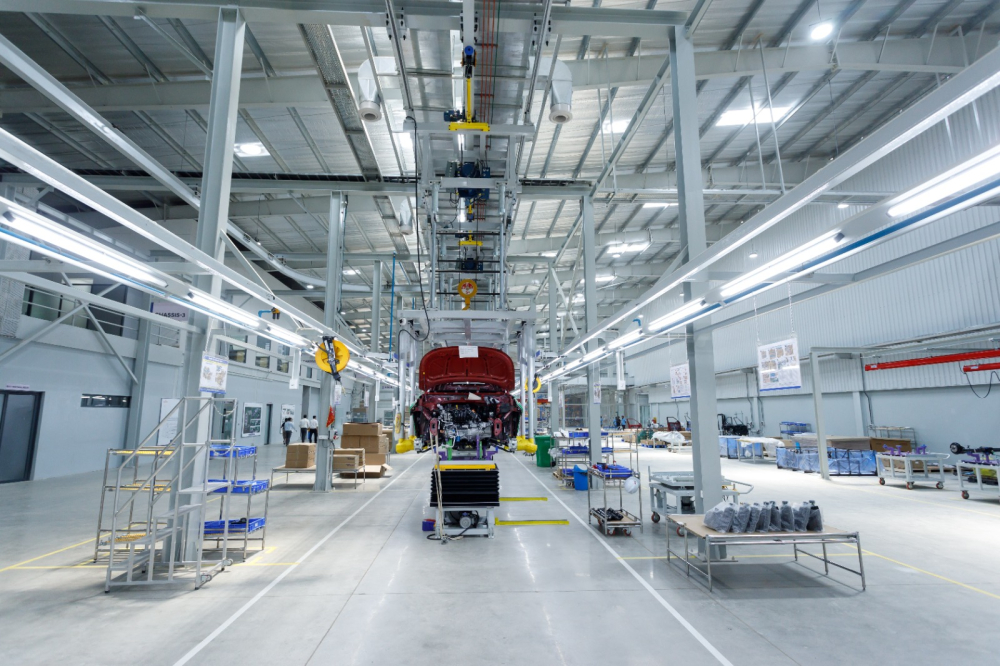
'Looking at the data for the half year of 2024, about 80 percent of EVs and 20 percent of IC vehicles are imported,' he said, 'so we are thinking of starting the production of EVs within the third quarter of 2025 by looking at the market He said that the production of the second model Grand i-10 will be started within the month. Production of Creta is expected to begin within four to five months of its production. He claims that three models of vehicles will be produced by March 2025. "Not according to the market, we should move according to the market," he says, "Accordingly, we are preparing to start the production of EV, we will prepare both IC and EV products." The
venue car is small and compact. "Nepal's soil and roads are suitable," he said, "so it can go anywhere, small lanes and gravel roads in villages." "Though this is not the case today, it will help in industrialization, employment, and skill development here in the future. Such industries will be helpful to some extent in stopping the youth who are migrating abroad," he said. It is difficult to make another investment here. 90 percent of the parts are brought from Korea and India to prepare the vehicle. 10 percent of Nepal goods are used.
'I produce 25,000 cars, I need 100,000 front headlights, rear and side lights, if you tell someone that you can set up an industry for this, he can dare.' He said that he could not establish an industry rather than make light.
However, he believes that it will be easy to establish fifty types of other industries in the future. "If we move forward with everyone's cooperation, we can bring about a situation where we can say that a big leap has been made after 10/20 years," he said. "The government has given some relief." ’ is defined as condition vehicles. "In the case defined in this way, a 25 percent customs discount has been given on the amount of duty used on the ready-made vehicle," he said. There is 80 percent customs duty on the
ready vehicle. "The parts that we bring assembled for production incur 60 percent customs duty, it is said that 50 percent discount is levied on the excise duty," he said, "Unassembled vehicle comes, we bring it here and sell it to the dealer." Excise duty is only paid at the customs point when we bring the prepared vehicle and sell it He said he had to pay. "But the sale of vehicles assembled and manufactured in Nepal also incurs customs duty, in which the consumer gets the vehicle after paying 32.5 percent excise duty and 13 percent VAT," he said. The percentage will be cheaper.'
The technicians from Hyundai's office in Korea have set up the 'assembly industry'. Trained the technicians working there for 6 months. Those same employees are now making cars. He complained that the problem is due to the unstable policy of the government. "Stable policy never came," he complains, "there is always fear when the budget comes." He said that the economic law introduced through the budget of the current financial year has tightened the production of electric vehicles in Nepal. "The industry has gone, the economic act that came in the 17th/18th has said that what the industry will do, more work has been done," he says All have Hyundai dealers.
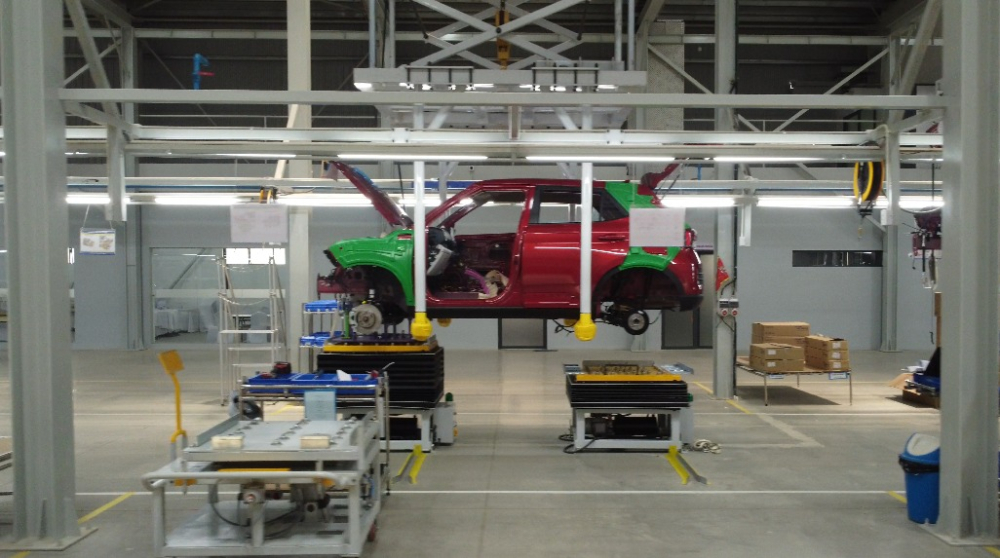
where dealer, service center is placed. In some places the land is owned and in others leased. The 'assembling' industry in automobiles is one of the various stages in the vehicle manufacturing industry. "Now we bring the parts that have already been welded, join them and make a vehicle," he said. "We need more investment to make parts," he said, "We need demand for that."
Despite the confusion, Lakshmi Group is determined to increase employment by producing more vehicles in the country. Preparations for EV vehicle production are underway. "When I was young, I heard that even needles are not made in Nepal," says Shrestha, "We were able to produce cars, everyone should take this as pride."
 प्रकाशित : भाद्र १६, २०८१ ०९:५९
प्रकाशित : भाद्र १६, २०८१ ०९:५९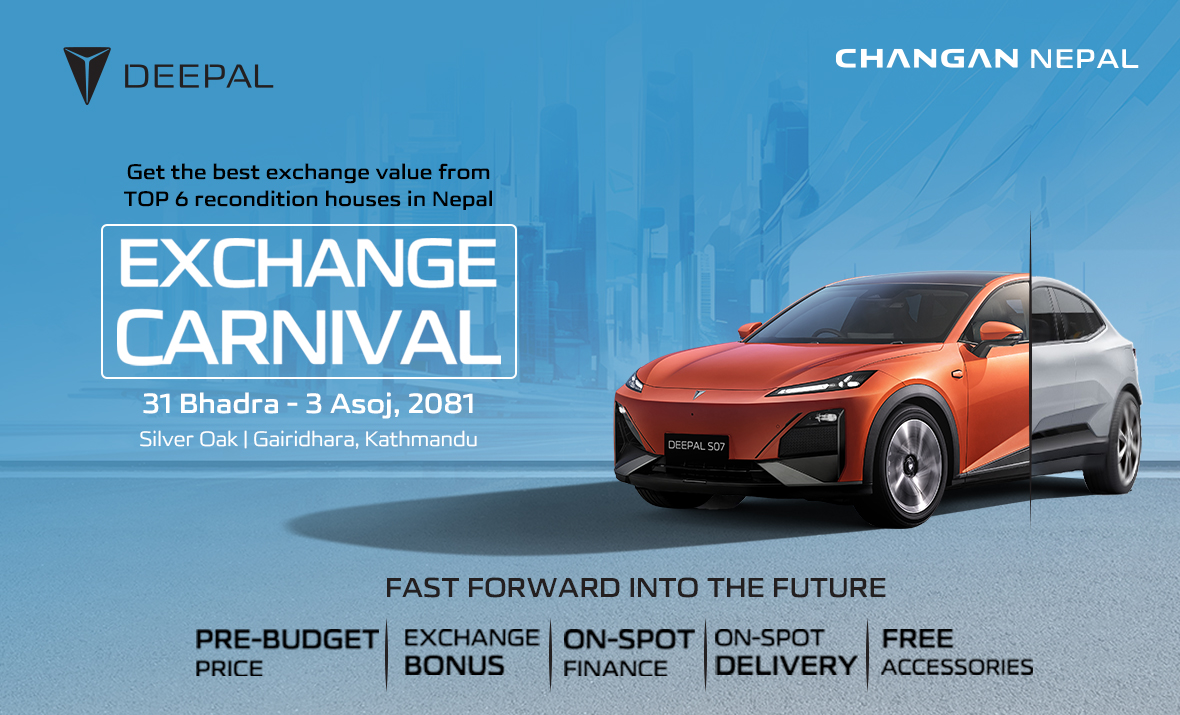

 २६.१२°C काठमाडौं
२६.१२°C काठमाडौं











